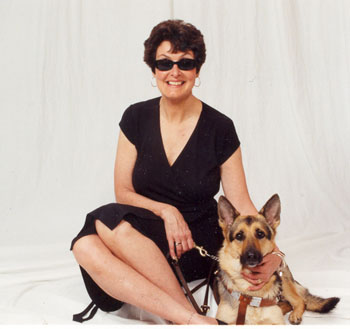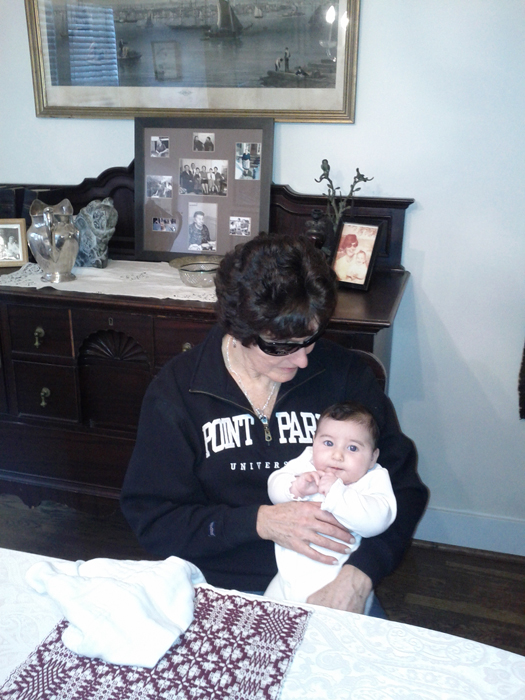Frequently Asked Questions
May I pat your dog?

No, not when she’s wearing a harness. Guide dogs are simply dogs that have been trained for certain tasks; otherwise, they are ordinary dogs, with all the instincts and wants and needs of their species. If someone pats my dog while she is working, she’ll forget her work, want to play, and bash me into a telephone pole. Telephone poles are painful; my nose can tell you! I ask everyone to treat my dog as if she were my cane. No one finds my cane adorable or pattable.
No one says, “Hi there, cane!” No one, so far, has wanted to sneak my cane a treat.
Do you have other pets?
My husband has caught sight of a cute mole in our garden, but I can’t really claim him as a pet. When our children were young and living at home, we housed various pets—gerbils, rabbits, and guinea pigs. The gerbils had a short life expectancy in our household, and my husband grew tired of leaving parties to minister to them, which usually meant feeding them medicine and ground food through an eye dropper, only to have them die in his hands. Our guinea pigs fared somewhat better. Pumpkin Larry, the namesake of my sister’s husband, turned out to be the mother of several litters, but died the day after delivering her third batch. Our yard has a marker for every deceased pet and looks more like a cemetery than a garden. Our son, Joel, gave our daughter, Leslie, a rabbit, after the last guinea pig went to the other world. She named him Methuselah, which proved to be apt. Methuselah exceeded his life expectancy by four years, well past his owner’s graduation from college. When Leslie left for the University of Wisconsin, Madison, Bob and I had an empty nest containing a rabbit and parakeet, Gus. Gus had a great personality. He sat on Leslie’s shoulder or chest while she did her homework. He definitely considered her his Mom. He adopted many of her attitudes, also, taking every opportunity to nip her brother’s finger or dive-bomb him. Joel respected his cocky nature. Gus and Methuselah died several years ago and now fertilize our backyard.
Do you have children?
Yes. Leslie and Joel.
How do you get your ideas?
I could fill an entire website answering this question. Ideas come out of my life, a favorite setting prompted Maggie’s Whopper, for instance. An exciting experience triggered Sarah’s Surprise, a hike along the rocky coast of Maine in search of shellfish and mussels. Most writers advise others to write what they know, what they are expert in. I’m an expert in blindness, and many of my books deal with that.
Will you visit my school?
Gladly. Here is my contact information: shalexan@verizon.net
How do you think of titles?
Ah, titles are difficult for me. Of the eight books I’ve published, I’ve only sold two whose titles stuck: Maggie’s Whopper and On My Own: the Journey Continues. My title for Mom Can’t See Me was “My Mom is Blind”, boring, right? My name for Sarah’s Surprise was “Rescue at Baldhead,” a dead give-away of the plot. I had fun with my editor, sending a list of joke titles before a friend suggested Mom’s Best Friend, a play on “man’s best friend.” A few of my humorous entries were “The Tail that Wags Mom,” “Mom will Never Walk Alone,” and “The Quick and the Dead.” After all my jokes, my editor never knew if I was serious when I entitled a new manuscript.
What is your favorite book?
Just as I cannot tell you which of our two kids is my favorite, I cannot choose a favorite book I’ve written.
I’m happy with each of them, thankfully. I’d hate to cringe when hearing certain passages from a published book, because
I can’t do a thing to fix it. As far as favorite books of all time, written by others, I love Middlemarch by Eliot and
Pride and Prejudice by Austen. Since I read constantly, I’m always finding astonishing other books, such as
The Life of Pi by Martel and Howard’s End by Forster. Every week I have a new favorite.
Favorite children’s books would fill a website, but here are a few: Danny, the Champion of the World; Boy;
and Going Solo, all by Dahl; Number the Stars, Lowry; Harris and Me, Paulsen;
So Far from the Bamboo Grove, Watkins; Carver: A Life in Poems, Nelson;
Ella Enchanted, Levine; any book by Mildred Taylor; Freak, the Mighty, Philbrick;
The Fault in Our Stars, Green; The Absolutely True Diary of a Part Time Indian, Alexi; and I'm really
a push-over for dystopian Y.A. books, the Matched series by Condie or the Delirium series by Oliver;
Then there are the classics in children's literature, Charlotte's Web, The Secret Garden, and
Rebecca of Sunnybrook Farm.
How long does it take to write a book?
It varies. I wrote Taking Hold: My Journey into Blindness first as fiction. I didn’t want to write an autobiography, because an author exposes much more of herself than she wants. Autobiographies also embarrass the author’s friends and loved ones. I wrote and re-wrote that fictional version for about a year; my editor rejected it, saying she wanted my story. I resisted, but finally gave in and wrote my story. That took almost another year. The shortest time I spent on a book was six months. The longest time was probably four years, Mom Can’t See Me. I wrote it first as a photo-essay, taking Joel to school. Friends in my writing group liked the content, but thought the pictures would be boring, all houses and sidewalks, and then, whoopee! A school. So I re-wrote it as a picture book about a seven-year old boy bringing a new friend home from school. I called it, “What Will He Think of Mom?” An editor sent me a two-page, single-spaced letter, asking for a re-write. She wanted it to be a novel. I wrote a one-hundred page novel. Finally, I turned it back to a photo-essay, this time using my daughter, Leslie’s, point of view. I wrote that version in six weeks and sold it immediately. Actually, now that I think about it, the book that took the longest to write was She touched the World: Laura Bridgman: Deaf-Blind Pioneer, over six years. Research for a biography is very time-consuming, and I wrote it first as a one-hundred-and-fifty page book, then a mid grade, and then a picture book, finally choking the life out of it. I absolutely thought I would be writing that book in the nursing home.
How can I get to be a writer?
There is no guaranteed route. But I’d suggest reading endlessly. Read happily, then read critically. Read books for kids; read books for adults, even books for dogs, if such exist. Then, go out and live your life. Living doesn’t mean sitting in front of TV. Be a doer. Books come out of living, out of interacting with people and the world.
Is it hard to be blind?
Frankly, yes—sometimes. Sight is very convenient. Most people walk around without much thought of how it’s done. They can walk, chew gum, talk on a cell phone, listen to a radio, talk, daydream, etc. Blind people can’t walk without using one hundred per cent of their brains to do it. Sight is also a pleasure. It’s a lovely thing to see the ocean or a snow-capped mountain. Blindness is a loss—no doubt about it. It takes me more time to do things than when I could see. But the challenge of blindness, like most challenges, gives the opportunity to grow and learn and change. Blindness has improved me in many ways. One student asked me, “I don’t pity you; should I?” Absolutely not. My life is very happy; I feel extremely lucky.
Questions about blindness:
Please check out my book, Do You Remember the Color Blue? In that book, I’ve answered the most frequently-asked questions about blindness. I explain how I do daily tasks, such as cooking, how the dog works, how I became blind, what it was like to be a blind parent, how I read, write, whether people treat me differently, whether being blind has changed me, and various other questions, such as why blind people wear sunglasses.

